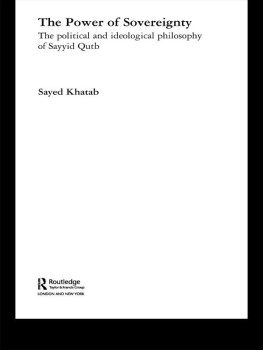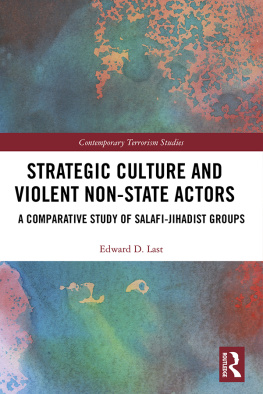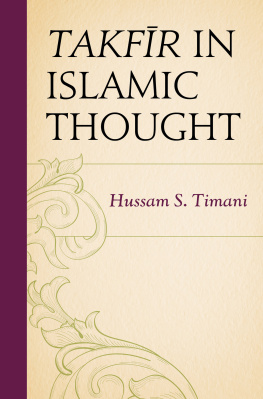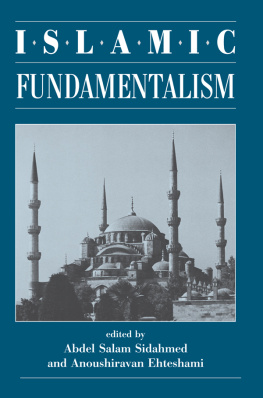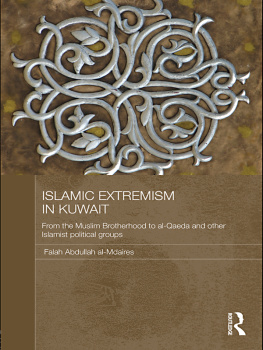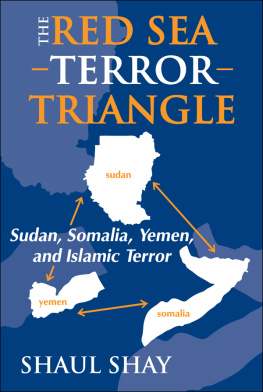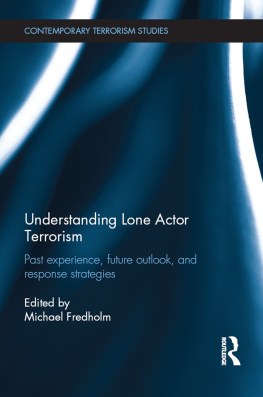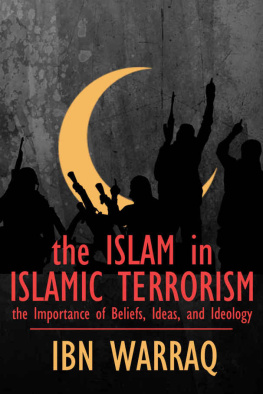First published in 2011 by
The American University in Cairo Press
113 Sharia Kasr el Aini, Cairo, Egypt
420 Fifth Avenue, New York, NY 10018
www.aucpress.com
Copyright 2011 Sayed Khatab
All rights reserved. No part of this publication may be reproduced, stored in a retrieval system, or transmitted in any form or by any means, electronic, mechanical, photocopying, recording, or otherwise, without the prior written permission of the publisher.
Dar el Kutub No. 24792/11
ISBN 978 977 416 499 6
Dar el Kutub Cataloging-in-Publication Data
Khatab, Sayed
Islamic Fundamentalism: The Theological and Ideological Basis of al-Qaidas Political Tactics/ Sayed Khatab. Cairo: The American University in Cairo Press, 2011
p. cm.
ISBN 978 977 416 499 6
1. Islamic SectsAfghanistan
297.8
1 2 3 4 5 614 13 12 11
Designed by Adam el-Sehemy
I slamic fundamentalism has risen to world prominence since the 1970s. It began locally, but reached its moment of climax in 2001 with the tragic events of September 11. Al-Qaidas terrorist attacks on the United States (U.S.) on September 11, 2001, constitute a real turning point, not only in the world order, but also in international relations. If September 11 occurred because of the presence of the U.S. in the Middle East, as extremists say, it is notable that the current level of the United States involvement in the Middle East is the greatest it has been for the past sixty years. These terrorist events have changed the manner in which terrorism is perceived. Contemporary terrorist groups are characterized by features that differ to a great extent from those of previous decades, in terms of their organizational structure, weaponry, methodology, and, more importantly, their ideas and objectives. The shift in the theological and ideological narratives of Islamic fundamentalism constitutes a new and more serious threat to national and international human security. Indeed, the change in theological narrative has had a profound influence on extremist ideology and has transformed the attitude of fundamentalists toward violence and terrorism. Currently, terrorism is a global phenomenon with an ideological dimension that propounds ideas more lethal than the network itself. The Global Islamic Front for the Jihad against the Crusaders and the Jews (al-Qaida) cannot live without its theocentric ideology, which has polluted our politics, our economy, our social relations, and our world. As to the identity of the polluter, the agent of this change, who has wrought a new level of complexity and controversy in international relations, al-Qaida is the primary focus. A great deal has been written about al-Qaida, much of it focused on the terrorists personality traits, and much, too, that may be categorized as journalism. With a few exceptions, no systematic in-depth study has so far been conducted on al-Qaidas theological narratives and their origins in medieval Islamic thought and movements. This, then, is the main objective of this book.
The processes set into motion by fundamentalism, extremism, and radicalization are still contentious issues within political arenas and the sociopolitical sciences. In seeking to understand fundamentalism, terrorism, and the process of radicalization, and how individuals and groups become indoctrinated and attracted to carrying out acts of terrorism, past studies have focused on sociopolitical, economic, and religious factors, as well as individual motivations, interpersonal relations, leadership behavior, and influencing attitudes.
While most of the existing research on the emergence of al-Qaida and its networks and terrorist acts correctly draws attention to the importance of theology and ideology, it has tended to focus on those individuals who went to Afghanistan and fought against the Soviets, established a global jihadist network, and maintained its growth and terrorist activity. These studies outline how al-Qaida emerged as a result of the influence of certain individuals who rose to prominence during a particular period and planned terrorist activities. It is appropriate, therefore, to consider that despite previous studies demonstrable virtues and merits, a focus on personality traits downplays the distinct importance of the theo-political and intellectual ideas that indoctrinate youth and attract many of them to violent acts of terrorism.
Recent studies have confirmed that radicalism sustains terrorism at its very roots.religious narratives and radical interpretations. Terrorism cannot survive without its theological narratives: had it been dependent on interpersonal relations or military power alone, it would never have gained any real foothold in global politics. Hence, winning the war against radicalism requires a better understanding of its underlying narratives.
Generating a counterargument to extremism and radicalization requires a more in-depth understanding of the narratives that al-Qaida uses to attract followers and to connect terrorist networks across borders. In investigating these issues, it is important to point out that many of these radical narratives have not come out of a vacuum and are not owned by al-Qaida, as such, but are borrowed from movements that emerged before al-Qaida. These key ideas and their related issues constitute the main focus and argument of this book.
This book contends that the theological and ideological discourse of Islamic movements of the modern age is largely the result of deliberate attempts to establish an Islamic order, and to confirm the theoretical relevance of Islam to the modern world. These movements were not established in isolation from the social and political circumstances surrounding them, which became dominant in the Muslim world and the Middle East, particularly during the second half of the twentieth century.
Al-Qaida as a title is new, but not as an ideology. An ideology is simply a set of ideas in which individuals and/or groups believe, and, based on it, take certain actions. Al-Qaidas theocentric ideology is not an offshoot of the present age, as it has come to be understood by a number of scholars, particularly since the tragic events of September 11, 2001 and their consequent conflicts. Al-Qaidas ideology is also not born of: the Islamic Revolution in Iran; the Soviet war in Afghanistan; the existence of the Taliban; the establishment of the Shii Amal and Hizbullah movements in Lebanon; the revival of Sufi movements in Eastern Europe and the Balkans; the formation of separatist movements in China, India, and the Philippines; or the rise of violence and terrorism in Egypt, Algeria, and North Africa.
Al-Qaidas ideology has historical roots, an intellectual heritage, and a blueprint for political activity, and it must also be understood in terms of its relation to surrounding psychological and sociopolitical circumstances, similar to those which emerged repeatedly over the centuries and which have continued until the present period. The meeting of ideology and circumstance is evident, for example, in the Islamic Liberation Partys attempt to overthrow the Egyptian government in April 1974; the assassination of Egypts Azhari minister Sheikh al-Dhahabi in 1977; the assassination of Egyptian President Sadat in 1981; the assassination of certain writers and activists such as Farag Fouda, in 1992; and the many attempts on the life of Egypts former president Mubarak.


